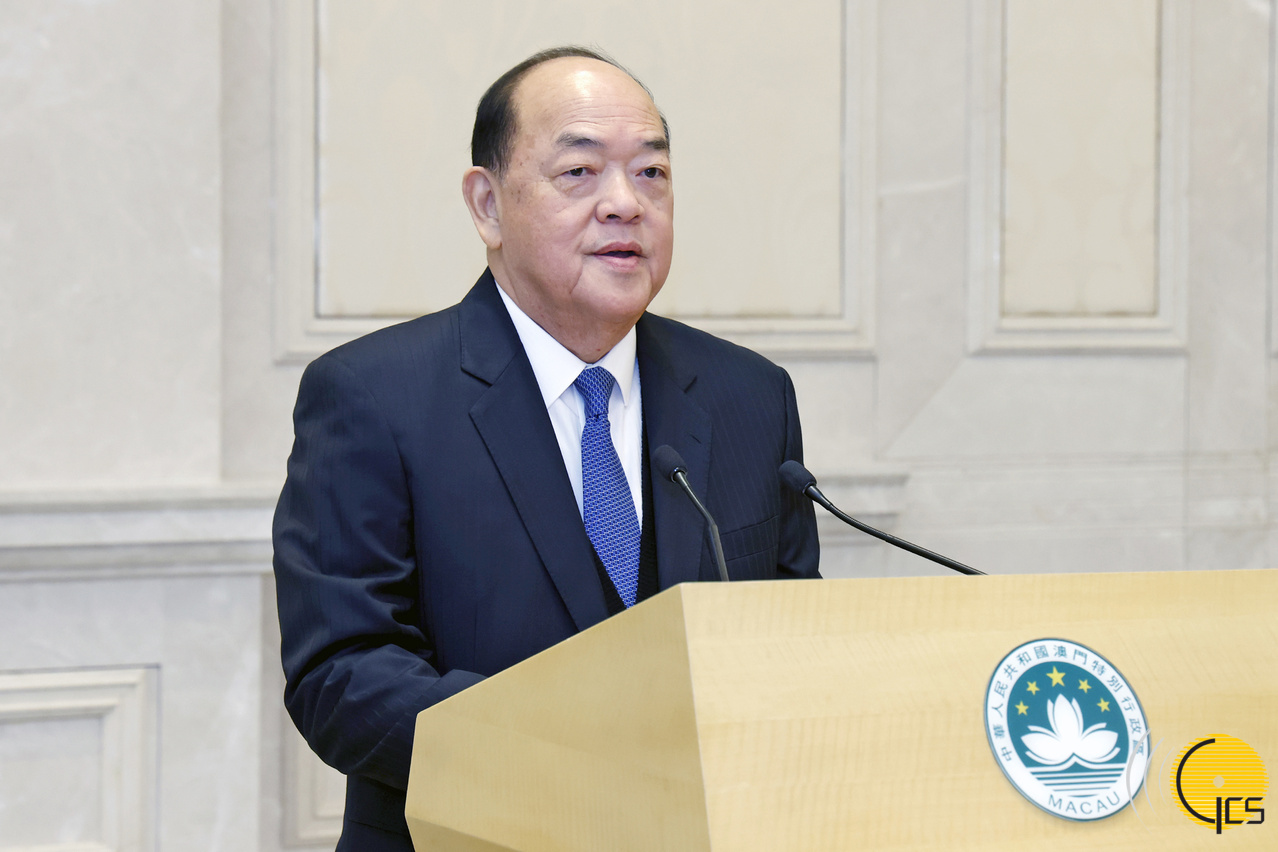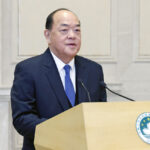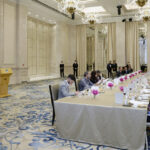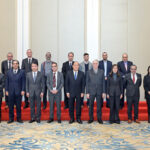 The Chief Executive, Mr Ho Iat Seng, delivers a speech at a lunch reception hosted for representatives of local news organisations reporting respectively in Portuguese and English.
The Chief Executive, Mr Ho Iat Seng, delivers a speech at a lunch reception hosted for representatives of local news organisations reporting respectively in Portuguese and English.
The Chief Executive, Mr Ho Iat Seng, today said he hoped that local news outlets reporting respectively in Portuguese and English could maintain their bridging role and play up to their communication strengths in terms of language and culture.
At a lunch reception hosted for Portuguese- and English-language news organisations in Macao, Mr Ho told them they were important mediums for readers and speakers respectively of Portuguese and English – whether based overseas or locally – to access information. The organisations reported extensively on new trends and fresh developments in Macao. That work, along with the foreign exchanges held by the Government, gave the outside world a better understanding of, and more confidence in, Macao’s development, as well as raising the city’s profile.
Mr Ho said representatives of such news outlets had visited, over the past year, other cities within the Guangdong-Hong Kong-Macao Greater Bay Area, as well as Tibet. Their reports had presented to their readers firsthand accounts of the high-quality development going on in China, as well as long-standing Chinese cultural and social traditions. The local news outlets had drawn fully on their unique vantage point within the Macao Special Administrative Region (MSAR), close to the mainland China, with access to the world.
Journalists working in Portuguese- and English-language news outlets in Macao have considerable expertise and a strong sense of responsibility. Their bridging function had always provided a reflection of the voices of the public, and had offered suggestions and facilitated cooperation with policy implementation, providing impetus for the Government’s undertakings across the board, said Mr Ho.
In line with the provisions of the Constitution of the People’s Republic of China, and the Basic Law of Macao, the Government would continue as always, to uphold press freedom, and support media outlets by actively assisting them in conducting interviews, so they could better perform their duties.
The Chief Executive went on to say that in the past year, Macao had entered a new stage of recovery and improvement under the leadership, and with the support, of the Central Government, along with the collective efforts of Macao residents.
Not long after normalisation of conditions at the beginning of last year, the Government had organised a delegation to visit three European countries, with Portugal as its first stop. This visit was of vital significance as it reinforced Macao’s exchanges with other places, further promoted Macao’s role as a platform between China and Portuguese-speaking countries, and achieved the goals of cementing friendly relations, identifying areas for deeper collaboration, and for the opening up cooperation opportunities.
The year 2024 marked the 75th anniversary of the founding of the People’s Republic of China, and the 25th anniversary of Macao’s return to the motherland. The year would also witness the completion of the Guangdong-Macao Intensive Cooperation Zone in Hengqin’s first-stage development goals, and the start of the Development Plan for Appropriate Economic Diversification of the Macao Special Administrative Region (2024-2028), noted Mr Ho.
As the new year unfolds, the Government has been preparing for the 6th Ministerial Conference of the Forum for Economic and Trade Co-operation between China and Portuguese-speaking Countries (Forum Macao) and will do its best to hold a number of high-profile events, including the 7th meeting of the Macao-Portugal Joint Committee. This was in order to expand Macao’s role as a platform between China and Portuguese-speaking countries, and bring the two sides’ economic and trade cooperation to a new level, he said.
In tandem, the Government would work in line with the overall policy direction of “strengthening recovery, fostering diversification, improving livelihoods, and enhancing development”. The Government would meet its responsibilities, take concrete forms of action, and foster positive interplay between stability and progress.
Further efforts would also be made to accelerate the implementation of the major tasks and key projects laid out in the “1+4” strategy, in a bid to speed up the development of the Cooperation Zone and effectively enable high-quality economic development in Macao. It was equally necessary to create a more harmonious society with continuous efforts to improve people’s livelihoods – and address the deep-seated conflicts and problems in socio-economic development – by constant improvement in governance capabilities. By making full use of its advantages, Macao would integrate better into national development and make progress in all its undertakings, said Mr Ho.
Mr Ho said he looked forward to the Portuguese- and English-language media reporting widely on celebratory events held in the remainder of the year. It was hoped that they could continue to offer greater assistance in expanding overseas tourist markets, identifying business opportunities for the four key industries, and promoting the prospects of the Cooperation Zone and the Greater Bay Area.
The Government would work together with the press to give an even greater number of people a better understanding of the successful practise of the “One country, two systems” principle in Macao, as well as the critical role that Macao plays as a platform connecting China with Portuguese-speaking countries, while also demonstrating Macao’s characteristics of co-existence and mutual integration of diverse cultures.




